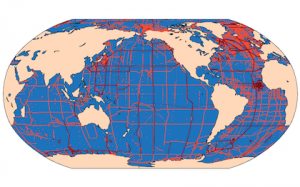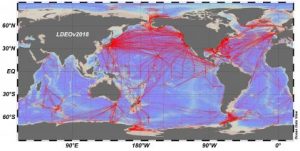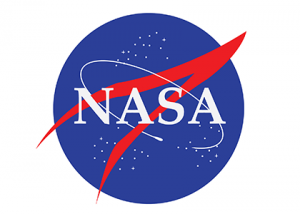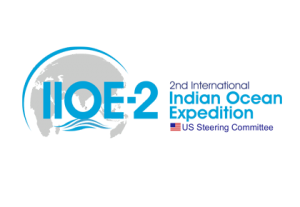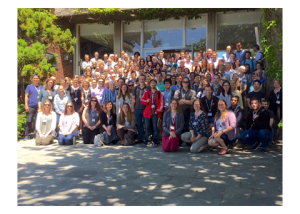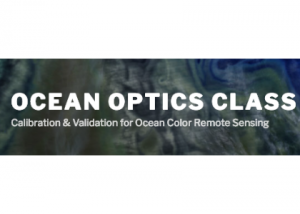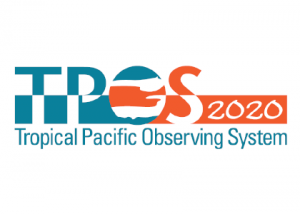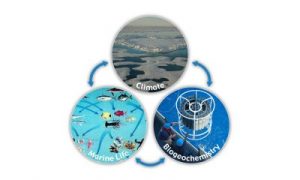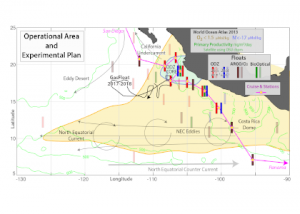Global Ocean Data Analysis Project (GLODAP) version 2 includes data from approximately one million individual seawater samples collected from almost 800 cruises carried during the years 1972-2013. Extensive quality control and subsequent calibration were carried out for salinity, oxygen, nutrient, carbon dioxide, total alkalinity, pH and chlorofluorocarbon data. Following calibration, the data were used to […]
Read MoreThe LDEO (Takahashi) Database Version 2018 (LDEO_Database_V2018) was published at OCADS/NCEI/NOAA: https://www.nodc.noaa.gov/ocads/oceans/LDEO_Underway_Database/ Approximately 13.5 million measurements of surface water pCO2 made over the global oceans during 1957-2018 have been processed to make a uniform data file in this Version 2018. Measurements made in open oceans as well as in coastal waters are included. The data […]
Read MoreCourse call “Approaches and Tools for Numerical Modeling of High Latitude Ecosystems” DEADLINE EXTENDED – 15 MAY 2019 The Institute of Marine and Limnological Sciences and the Research Center Dynamics of High Latitude Marine Ecosystems – IDEAL of University Austral of Chile and the Research Center for the Oceanography of the Southeastern Pacific – COPAS […]
Read MoreNASA Research Opportunities in Space and Earth Sciences 2019 (ROSES-2019) – Released March 14, 2019 ROSES-18 Amendment 67 presents a new opportunity in program element A.48, Plankton, Aerosol, Cloud, Ocean Ecosystem (PACE) Mission System Vicarious Calibration. ROSES-18 Amendment 66 presents a new opportunity: Carbon Monitoring System in this program element, A.49 – A.49 Carbon Monitoring System The first amendment (ROSES 2018 program element A.48) is focused on delivery of […]
Read MoreSAVE THE DATE! Ocean-Atmosphere Interactions: Scoping directions for U.S. research – October 1-3, 2019 This workshop will gather U.S. scientists working at the air-sea interface to identify research priorities and facilitate the communication and collaboration required for future significant research advances. Leadership for this workshop will be provided by the Ocean Atmosphere Interaction Committee (OAIC). […]
Read MoreThe website for the OCB Indian Ocean Science Planning community workshop has been revamped as both an archive for the 2017 workshop (report, presentation slides and recordings, poster gallery) and the new home of information, publications and more related to the US Steering Committee of the 2nd International Indian Ocean Expedition. Please visit and share […]
Read MoreThe 2019 OCB Summer Workshop will be held June 24-27 in Woods Hole, MA. Registration will open in early April. The 2019 plenary sessions are: Anthropogenic changes in ocean oxygen: Coastal and open ocean perspectives Approaches and challenges to understanding biogeochemical cycling across the land-ocean aquatic continuum Calcification and the carbon cycle Carbon cycle feedbacks […]
Read MoreOcean Optics Summer Class Calibration and Validation of Ocean Color Remote Sensing Dates: June 3 – June 28, 2019 Instructors: Emmanuel Boss (coordinator), Ivona Cetinic, Curt Mobley, Collin Roesler, Ken Voss, and Jeremy Werdell. An intensive four-week, cross-disciplinary, graduate-level course in Optical Oceanography at the University of Maine’s Ira C. Darling Marine Center in summer […]
Read MoreDear Tropical Pacific Observing System Experts and Stakeholders: We write to invite your review of the Draft of the TPOS 2020 Second Report. This draft is being circulated to experts and stakeholders who we believe can critically assess the draft and provide guidance on how it should be adjusted and improved. This will be the […]
Read MoreOCB is pleased to announce the outcomes of the recent OCB proposal solicitation. With 11 proposals, the decision process was challenging this year. The proposals were scored based on scientific merit, relevance to OCB, potential benefits to the broader OCB community, and timeliness. The following new OCB activities have been selected for funding in 2019-2020. […]
Read MoreNCAR Early Career Faculty Innovator Program The Early Career Faculty Innovator Program is a new funding opportunity for early career faculty in the social sciences and STEM outside of NCAR’s core expertise to co-develop interdisciplinary research projects in partnership with scientists and engineers at the National Center for Atmospheric Research (NCAR) in Boulder, Colorado. The […]
Read MoreBy Mark A. Altabet (SMAST/U. Mass. Dartmouth), Craig McNeil, and Eric D’Asaro (both at APL / U. Washington) Oxygen deficient zones (ODZs) constitute a small fraction of total oceanic volume yet play an important role in regulating global ocean carbon and nitrogen cycles. They are critical for regulating the ocean’s nitrogen budget, as loss of […]
Read MoreThe BIARRITZ (Bridging International Activity and Related Research into the Twilight Zone) workshop will take place July 22-26, 2019 at the National Oceanography Centre (NOC) in Southampton, UK. This workshop will bring together observationalists and modellers in a practical workshop to advance our understanding of the Twilight Zone by making best use of extensive current […]
Read MoreWe would like to thank the OCB community for submitting so many high-quality nominations for the OCB Scientific Steering Committee. We also want to thank the nominees for their willingness to serve, and hope that if you were not elected this time, you will remain interested and willing in future SSC elections. The election results […]
Read MoreIOCCP and BONUS INTEGRAL are thrilled to open online applications for an international training course “Instrumenting our ocean for better observation: a training course on a suite of biogeochemical sensors”. The course will be held at the Sven Lovén Center for Marine Sciences in Kristineberg, Sweden, on June 10-19, 2019. The goal of the course […]
Read More

